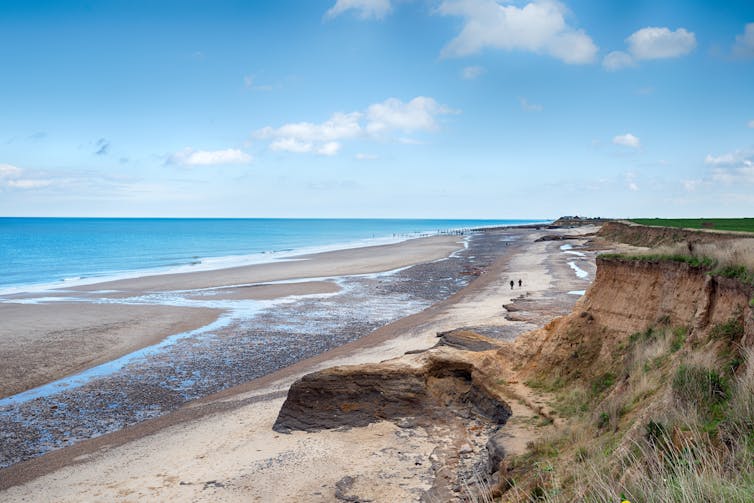The parish of Whimpell once stood on the Norfolk coast between the village of Happisburgh and the sea. Whimpell disappeared into the sea centuries ago thanks to coastal erosion. And now Happisburgh is facing a similar threat.
Some, however, do not intend to give up without a fight. On October 17 2023, a case was brought against the UK government by two people supported by Friends of the Earth, an environmental charity.
The first is Kevin Jordan, whose home is at risk due to coastal erosion in Hemsby, Norfolk. The second is Doug Paulley of Wetherby in west Yorkshire, who suffers from a number of medical issues that make him particularly vulnerable to the increased frequency and intensity of extreme heat.
Only a summary of the claims has been made available publicly. But it is clear that the claimants are focusing on the UK’s most recent national adaptation programme (NAP3). The NAP3 outlines the actions the government and others will take to adapt to the effects of climate change from 2023 to 2028.
The claimants argue that the NAP3 is not sufficiently ambitious and specific. It is also argued that there is no evidence that an appropriate assessment of the risks posed by climate change has been conducted, and that the unequal impact on protected groups has not been considered.
The claimants add that the government has failed to protect a number of human rights, including the rights to property, life, respect to private and family life, and the prohibition of discrimination.

Legality of the claims
The preparation of the national adaption programme is required by section 58 of the UK Climate Change Act 2008. This article demands that the NAP3 sets out the objectives of the UK in relation to adaptation, as well as proposals for meeting these objectives.
However, section 58 does not explicitly require the government to take specific, ambitious action on adaptation to the impacts of climate change. The only indication in this law concerning the level of ambition that national adaption programmes should achieve is that adaptation objectives, proposals and policies “must be such as to contribute to sustainable development”.
There is no doubt that a progressive interpretation of the Climate Change Act may set an important precedent in relation to government obligation to actively adopt adaptation measures. The court, for example, may accept that the instruction that the NAP3 will “contribute to sustainable development” means that the government is obliged to adopt ambitious and specific adaptation measures, such as those requested by the claimants.
At the same time, it is also possible the court will understand this instruction in a very limited manner. For example, the court may clarify that the obligation to adopt adaptation measures is entirely within the discretion of the government and therefore, to put it bluntly, the government can do as it pleases. This is not an unlikely prospect given the High Court’s earlier narrow interpretation of “sustainable development”.
The human rights arguments made by the claimants are clearer and simpler to understand. The fact that this case focuses on the government’s obligation to adapt to, rather than mitigate, climate change makes it easier to prove. The claimants don’t have to demonstrate that the UK government caused harm to their human rights, only that it has failed to protect them from the impacts of climate change.
A growing trend
This case is hardly a unique effort but rather part of a wider and growing trend of climate litigation targeting both states and companies. Globally, hundreds of cases have been brought against states in the past two decades, with 103 of them occurring in the UK.
A somewhat similar litigation – KlimaSeniorinnen v Switzerland – is also currently before a different tribunal: the European Court of Human Rights. In this instance, a group of elderly citizens are claiming that the impacts of climate change are affecting certain human rights, including their right to life due to (among other things) climate change-related heatwaves.
The current UK case offers a glimpse into the potential benefits and risks that are involved in this strategy. The benefits are clear. The case has already been reported by leading media outlets and is being discussed by academics.
Winning the case and forcing the government to act on climate change could yet be another potential win, albeit an uncertain one given the record of climate litigation in the UK. While there have been a few celebrated cases, the vast majority of UK cases have been rejected.
The risks of climate litigation are equally clear. The court may clarify the meaning of the law – as it has done before – in a manner that those supportive of environmental action will not approve of.
This same risk exists in the current case. The court may limit the link between the impacts of climate change and human rights, or clarify that adaptation plan objectives could be as limited as the government wishes them to be.
To what extent this type of legal action will help tackle climate change in the UK remains to be seen. Given the risks discussed above, one may also question whether these cases bring more good than harm. But it’s a global phenomenon that shows no sign of stopping any time soon.
The authors do not work for, consult, own shares in or receive funding from any company or organisation that would benefit from this article, and have disclosed no relevant affiliations beyond their academic appointment.
This article was originally published on The Conversation. Read the original article.







